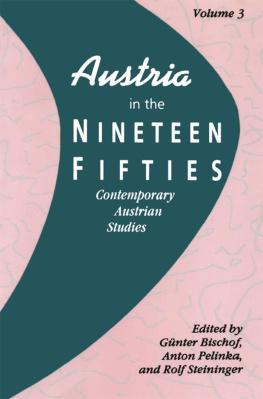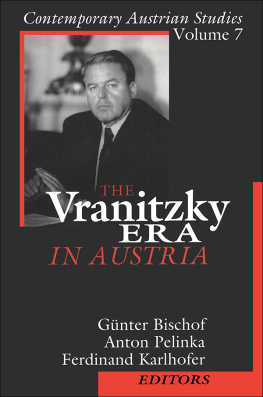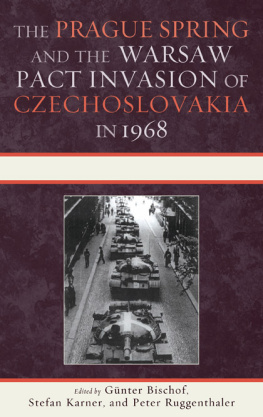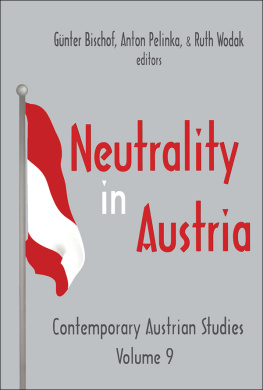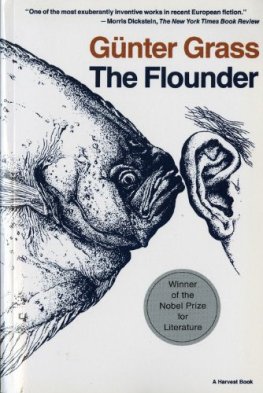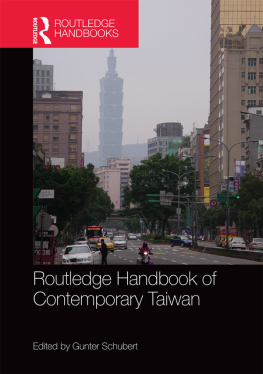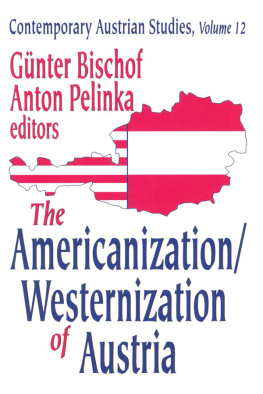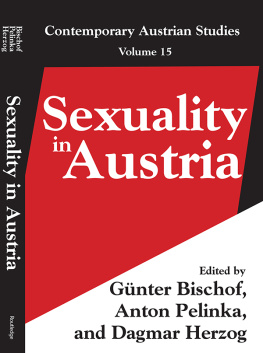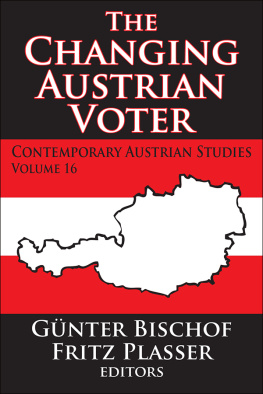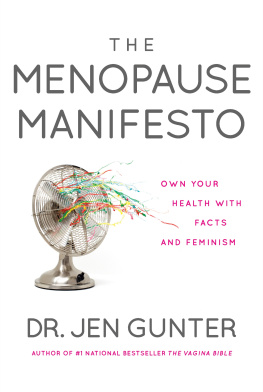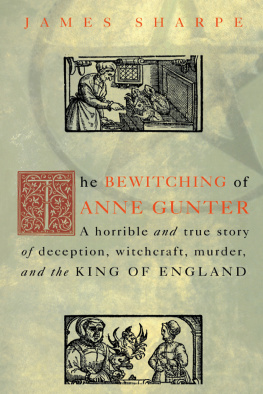Austria
in the
NINETEEN
FIFTIES
Contemporary Austrian Studies
Sponsored by the University of New Orleans and Universitt Innsbruck
Executive Editors
Erich Thni, University of Innsbruck
Gordon H. Mueller, University of New Orleans
Editors
Anton Pelinka, University of Innsbruck
Gnter Bischof, University of New Orleans, University of Munich
Assistant Editors | Copy Editors |
Irene Brameshuber | Irene Brameshuber |
Ellen Palli | Sonja Bahn |
Production Editor
Ellen Palli
Advisory Board
Felix Butschek
Institute of Economic Research, Vienna
Wolfgang Danspeckgruber
Princeton University
Peter Gerlich
University of Vienna
David F. Good
Director, Institute of Austrian Studies, University of Minnesota
Robert Jordan
University of New Orleans
Robert H. Keyserligk
University of Ottawa
Radomir Luza
Tulane University
Diemut Majer
University of Berne
Andrei S. Markovits
University of California, Santa Cruz
Sybil Milton
United States Holocaust Memorial Council, Washington, D.C.
Hanspeter Neuhold
University of Vienna and Director, Austrian Institute for International Politics, Laxenburg
Helga Nowotny
University of Vienna
Michael Pollak ()
National Center for Scientific Research, Paris
Peter Pulzer
Oxford University
Rolf Steininger
University of Innsbruck
Gerald Stourzh
University of Vienna
Publication of this volume has been made possible through a generous grant from the Austrian Ministry of Foreign Affairs and the Austrian Culture Institute in New York.
The Bank Gebrder Gutmann Nfg. AG. the University of Innsbruck, and Metro College of the University of New Orleans have also supported this publication with special grants for translations.
First published 1995 by Transaction Publishers
Published 2019 by Routledge
2 Park Square, Milton Park, Abingdon, Oxon OX14 4RN
52 Vanderbilt Avenue, New York, NY 10017
Routledge is an imprint of the Taylor & Francis Group, an informa business
Copyright 1995 by Taylor & Francis
All rights reserved. No part of this book may be reprinted or reproduced or utilised in any form or by any electronic, mechanical, or other means, now known or hereafter invented, including photocopying and recording, or in any information storage or retrieval system, without permission in writing from the publishers.
Notice:
Product or corporate names may be trademarks or registered trademarks, and are used only for identification and explanation without intent to infringe.
Library of Congress Catalog Number: 94-33182
Library of Congress Cataloging-in-Publication Data
Austria in the nineteen fifties/edited by Gnter Bischof, Anton Pelinka; editorial consultant, Rolf Steininger.
p. cm.(Contemporary Austrian studies; v. 3)
Includes bibliographical references.
ISBN 1-56000-763-X (alk. paper)
1. AustriaPolitics and government1945- 2. AustriaHistoryAllied occupation, 1945-1955. 3. AustriaEconomic conditions1945- 4. AustriaForeign relationsUnited States. 5. United StatesForeign relationsAustria. I. Bischof, Gnter, 1953- . II. Pelinka, Anton, 1941- . III. Steininger, Rolf, 1942- . IV. Series.
D899.1.A887 | 1994 |
943.60523dc20 | 94-33182 |
CIP |
ISBN 13: 978-1-56000-763-0 (pbk)
ISBN 13: 978-1-138-51906-0 (hbk)
Gnter Bischof
I.
The 1950s in Austrian history constitute the hinge between the cruel fates of World War II and todays political stability and widespread prosperity. In 1945 the founding fathers of the Second Republic had to deal with a four-power occupation, next to undoing the traumas of the Anschlu-era. The Austrians quickly wanted to forget about their roles in World War II. The national-unity coalition government advocated a mythology of starting with a clean slate (Stunde null), including the topos of a dormant Austrian nation resisting Hitlers merciless dictatorship. Gathering hope for the future became more important than mastering the past. After seven years of Anschlu and six years of war, securing the physical survival of a psychologically dejected and numb population and rebuilding the war-torn economy understandably became the top priorities of the Austrian political leadership. Overcoming the often violent, fragmented political culture of the First Republic, a search for consensus between the political Lager characterized domestic politics; remarkable political stability resulted from the relative harmony between die Zwei (Conservative VP and Socialist SP). In foreign policy, negotiating an Austrian Treaty in order to rid the country of the four-power occupation (which reminded Austrians daily that they had not only been victims of World War II) became the single-most important issue on the foreign policy agenda. The repercussions of the rigid East-West Cold War, however, caught Austria up in the maelstrom of superpower conflict and prevented a resolution to the Austrian problem.
The effects of World War II and the unusually long occupation in a liberated country lingered on into the 1950s. The quadripartite occupation (which was hardly noticed any more in the Western zones) lasted until 1955 and ended with the signing of the Austrian State Treaty and the reestablishment of a sovereign and neutral country. The consensus of the SP-VP Great Coalition government characterized the 1950s as did Austrias strict anti-Communism and close orientation towards the West (for a while Austria even ended up being a quasi- secret ally of the West). The Austrians did not experience the kind of comsumerist prosperity of Americans in the 1950s (there were relatively few TVs, cars or vacations, even in the middle class). There was no GI Bill of Rights for Austrian war veterans who as German soldiers had to cope with nagging dejection and defeat. Similar to the Germans, the Austrians escaped the miseries of the past and historical memory by a single-minded effort of concentrating on rebuilding their country and their personal lives, often times from scratch (if you consider, for example, that cities like Wiener Neustadt were almost totally destroyed by the bombing war, or that some prisoners of war returned from Siberia as late as 1955).


